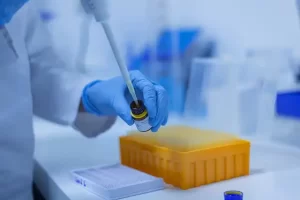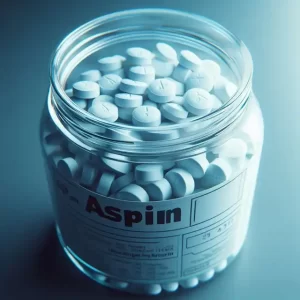mRNA-based CAR-T therapy successfully achieved clinical trials for autoimmune diseases for the first time
- Early Biomarker for Multiple Sclerosis Development Identified Years in Advance
- Aspirin Found Ineffective in Improving Recurrence Risk or Survival Rate of Breast Cancer Patients
- Child Products from Aliexpess and Temu Contain Carcinogens 3026x Over Limit
- Daiichi Sankyo/AstraZeneca’s Enhertu Shows Positive Results in Phase III DESTINY-Breast06 Clinical Trial
- Mn007 Molecules Offer Potential for Combating Streptococcus pyogenes Infection
- Popular Indian Spices Banned in Hong Kong Over Carcinogen Concerns
mRNA-based CAR-T therapy successfully achieved clinical trials for autoimmune diseases for the first time
- AstraZeneca Admits for the First Time that its COVID Vaccine Has Blood Clot Side Effects
- Was COVID virus leaked from the Chinese WIV lab?
- HIV Cure Research: New Study Links Viral DNA Levels to Spontaneous Control
- FDA has mandated a top-level black box warning for all marketed CAR-T therapies
- Can people with high blood pressure eat peanuts?
- What is the difference between dopamine and dobutamine?
- How long can the patient live after heart stent surgery?
Breakthrough: mRNA-based CAR-T therapy successfully achieved clinical trials for autoimmune diseases for the first time.
CAR-T cell therapy is an innovative class of cancer immunotherapy, which has achieved impressive and strong efficacy in blood cancers such as leukemia, lymphoma and myeloma. At present, the FDA has approved 6 CAR0T cell therapies for marketing.
In addition to being used to treat cancer, Professor Georg Schett of the University of Erlangen-Nuremberg in Germany has also successfully treated two autoimmune diseases, systemic lupus erythematosus and anti-synthetase antibody syndrome, with CAR-T cell therapy.
Myasthenia Gravis (MG) is an autoimmune disease of the nervous system. The most common cause is that the body’s immune system attacks the protein that communicates between nerve cells and muscles, resulting in muscle weakness.
CAR-T cell therapy can have serious side effects, which are acceptable for patients with advanced cancer, but for a chronic autoimmune disease like myasthenia gravis, it seems not worth the risk. Typically, CAR-T cells are constructed by delivering and integrating DNA to T cells, which causes the delivered DNA to persist in the T cells and replicate as the cells divide, which can lead to amplification effects and severe side effects.
In order to avoid such side effects of CAR-T cell therapy, Cartesian Therapeutics has developed a new platform that uses mRNA instead of DNA to reprogram T cells—RNA Armory®, mRNA delivered through lipid nanoparticles (LNP) does not It is integrated in the T cell genome and therefore does not replicate with cell division. This mRNA-based CAR-T cell therapy is a short-term therapy that requires repeated injections .
The therapy developed by Cartesian , called DESCARTES-08 , is the first new RNA-based CAR-T cell (rCAR-T)for the treatment of autoimmune diseases, and it has advanced into clinical trials for the first time. This clinical trial aims to To determine the ideal dose to effectively reduce muscle weakness in patients with myasthenia gravis with minimal side effects.
Recently, researchers from the University of California, Irvine, the University of North Carolina at Chapel Hill, the University of Miami, and Cartesian have published a paper entitled: Safety and clinical activity of autologous RNA chimeric antigen receptor T-cell therapy in myasthenia in The Lancet Neurology gravis (MG-001): a prospective, multicentre, open-label, non-randomised phase 1b/2a study research paper 【1】.
In this prospective, multicenter, open-label, Phase 1b/2a clinical study, mRNA-based CAR-T cell therapy offered the potential to more durablely reduce symptoms of myasthenia gravis and was well tolerated, with no patients experiencing Obvious adverse reactions.

CAR-T cell therapies have been highly effective in the treatment of hematologic malignancies, but treatment-related toxicities and the need for lymphocyte depletion (myeloablation) prior to treatment limit their use in patients with autoimmune diseases.
In order to explore the use of CAR-T in the treatment of patients with autoimmune diseases and improve its safety, the research team used mRNA instead of traditional DNA to engineer CAR-T cells (rCAR-T) to target expression on plasma cells B cell maturation antigen (BCMA) .
To test the applicability of this approach, the research team used rCAR-T to treat patients with myasthenia gravis , an autoimmune disease of the nervous system mediated in part by pathogenic plasma cells that express autoantibodies.
In this clinical trial, a total of 14 patients with generalized myasthenia gravis received different doses of rCAR-T cell therapy (Descartes-08) , targeting cells that produce antibodies to myasthenia gravis, without prior lymphatic Cell removal (myeloablation) . In the phase 1b trial (3 patients) , patients were treated with three dose escalations to determine the maximum tolerated dose.
In the phase 2a trial (11 patients) , patients received 6 doses of treatment at the maximum tolerated dose (once a week) , the primary endpoint was safety and tolerability , and the secondary endpoint was to assess the Disease severity and biomarkers.
Results showed that three patients experienced complete or near complete resolution of symptoms after treatment, an effect that persisted six months after treatment. Two other patients no longer required chronic intravenous immunoglobulin therapy (the treatment for severely ill patients with myasthenia gravis) .
No dose-limiting toxicity, cytokine release syndrome or neurotoxicity occurred during treatment, and the common adverse events were headache (6/14) , nausea (5/14) , vomiting (3/14) and fever (4/14) , these adverse events resolved within 24 hours of the infusion.
Overall, Descartes-08 was generally safe and well tolerated in this first clinical trial of rCAR-T cell therapy for autoimmune diseases . The myasthenia gravis severity scale showed a clinically meaningful reduction at follow-up up to 9 months after the infusion.
This suggests that rCAR-T cell therapy can be used as a potential new method for the treatment of myasthenia gravis and other autoimmune diseases, which deserves further study.

Dr. Murat Kalayoglu , President and CEO of Cartesian, said, ” We have seen profound and durable responses to Decartes-08 treatment in clinical trials, which lasted for at least 6 months after treatment.
The company has now begun a larger randomized, placebo-controlled clinical trial, the first of its kind for an engineered adoptive cell therapy.
Cartesian’s current R&D pipeline
References :
1. https://www.nejm.org/doi/full/10.1056/NEJMc2107725
2. https://doi.org/10.1016/S0140-6736(23)00023-5
https://doi.org/10.1016/S1474-4422(23)00194-1
https://www.cartesiantherapeutics.com/2023/06/21/cartesian-therapeutics-announces-landmark-study-in-the-lancet-neurology-of-first-successful-clinical-trial-of-rna-cell- therapy-in-autoimmunity/
mRNA-based CAR-T therapy successfully achieved clinical trials for autoimmune diseases for the first time
(source:internet, reference only)
Disclaimer of medicaltrend.org
Important Note: The information provided is for informational purposes only and should not be considered as medical advice.



